It's not oxygen, it's moisture, and moisture absorbing flux residue. Add light, moisture, and you get "electro-migration", electrolysis, and all sorts of nasties that kill the cells.
wash soldered cells in IPA, triple rinse in IPA, and then seal - but with a water VAPOR resistant seal. Plastics, paints and epoxies are NOT water vapor tight, it blows right through them. Glass, suitably thick metals, engineered plastics (eva, tedlar) are.
* IPA isopropyl alcohol
Cheap methods of encapsulating?
Collapse
X
-
Thanks Hank!! Well Done.
Keep us posted of any significant findings as these age.
I have about 5 Panels ready for encapsulation...
I'll post my findings as well.
I'm curious as to how the cells would do with no encapsulation, just on glass with no backing. I haven't found any posts or info showing this data.
Has anyone had their box of cells on the shelf showing any oxidation or other corrosion, just from being exposed to air? Descubre cómo realizar el 1Win Login y Registro de forma segura y eficiente. Aprende sobre los métodos de depósito y retiro, bonos exclusivos, y obtén respuestas a preguntas frecuentes. Únete a 1Win y disfruta de una experiencia de juego inigualable.
Descubre cómo realizar el 1Win Login y Registro de forma segura y eficiente. Aprende sobre los métodos de depósito y retiro, bonos exclusivos, y obtén respuestas a preguntas frecuentes. Únete a 1Win y disfruta de una experiencia de juego inigualable.
This is interesting - I wonder how much the mentioned material costs...
That article and another one state that the shelf life for cells is amazingly long - over 20 years. I've read that other places, but I can't remember where. Maybe just being stacked on top of each other is enough to keep the oxygen at bay...weird. Maybe someone will have better information.
Good luck santhony! I hope your project goes well! I'll be looking forward to your results. What are the stats on your panels?Leave a comment:
-
Thanks Hank!! Well Done.
Keep us posted of any significant findings as these age.
I have about 5 Panels ready for encapsulation...
I'll post my findings as well.
I'm curious as to how the cells would do with no encapsulation, just on glass with no backing. I haven't found any posts or info showing this data.
Has anyone had their box of cells on the shelf showing any oxidation or other corrosion, just from being exposed to air?Leave a comment:
-
It's super clear. If it didn't have brush marks made by yours truly, it would look like clear plastic. I did pretty much the same thing the other user did, except instead of damming and pouring I tried brushing. I've done my second panel now, and it's working great there too. On the first panel, I have 2 coats of it mixed w/mineral spirits and brushed on lightly and tack dried, then a 3rd coat of full-strength TTR gooped around all the edges of the cells. It's been drying like that for about 4 hours, and there's no warping or cracking of the cells. The stuff dries really nicely, even mixed with spirits!
The second panel has 1 coat of light brushing mixed, and the same gooped coat as the 3rd coat above. I think one light coat to cover the back of all the cells is sufficient, so we'll see.
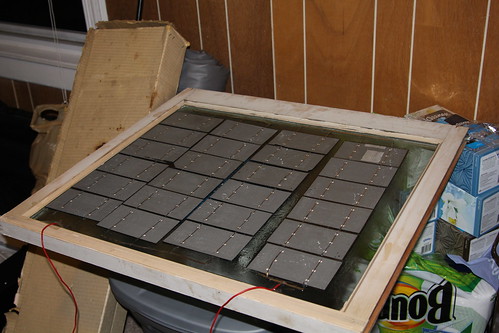
Solar Panel Building by hardwarehank, on Flickr
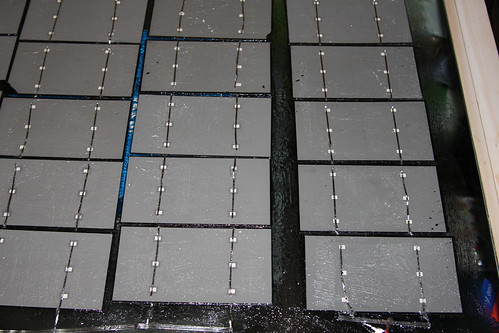
Solar Panel Building by hardwarehank, on Flickr
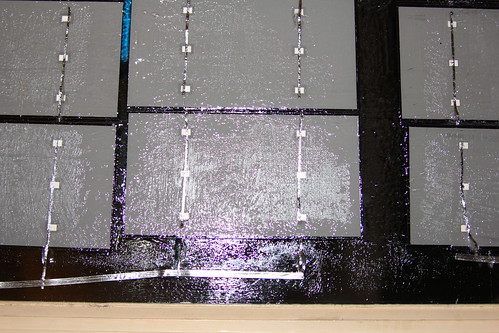
Solar Panel Building by hardwarehank, on Flickr
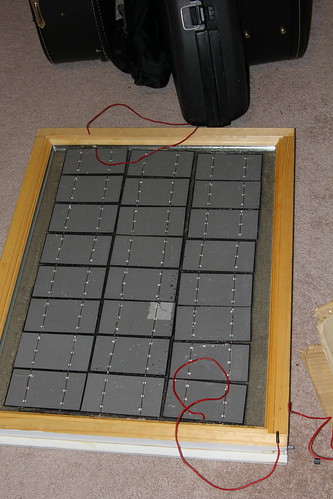
Solar Panel Building by hardwarehank, on Flickr
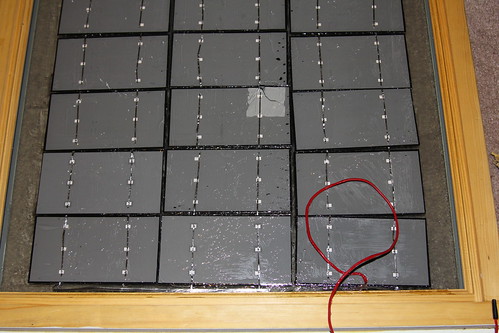
Solar Panel Building by hardwarehank, on Flickr
These are my first panels, so you may notice some ... issues ... I had along the way. Just minor stuff. Hopefully I'll hone my technique so I stop making mistakes most of the time.
Once the second panel dries, I'll bring it outside and take some more pictures. The front of the first panel looked beautiful after the first coat, and the stuff was tacky enough even after 12 hours to turn it vertical and take it outside for a test-drive. Good luck! Post pictures once you get yours done, and let me know if any variation in technique makes things more awesome!Leave a comment:
-
Is it pretty clear? How thick did you make it? Thanks for the reply, I will be using this for sure!!!
Leave a comment:
-
So, I tried my Through the Roof today, and it is awesome. You open the can to find a completely clear (!) goo, which is really thick. I used the recipe offered in one of the previous posts (2 parts TTR (Through the Roof), 1 part mineral spirits), and it makes a cloudy slurry when blended. I brushed it on the back of my cells with a brush, and it hardened up really nicely with the windows open in a warm room overnight. Of course, there were no occupants in the room at the time (fumes!). YMMV. Anyway, I put another coat on today, and so far so good. After the first coat, I took it outside to test it. It produced a little over 11V open circuit voltage on a cloudy day here in Maryland. There are only 24 cells at 0.5V each, which means 12V total, so that's not too bad! I don't have a good enough multimeter (yet) to test the short circuit current, but I'll remedy that shortly. Overall, I feel really good about this. I bought my cans from Ace Hardware online for about $10/qt. And I have only used maybe 1/3 of a qt. so far on my first panel. My cost for that panel is:
$1 per cell * 24 = $24 +
1 Window from recycling center = $3 +
1/2 qt. of Through the Roof (estimate) = $5 +
Plywood for backing - 1/4 sheet = $1 +
Various wires and screws and junk = $3
Total = $36
Assuming they perform to spec, the cells produce 1.75W each in full sun. That means this should be a 42W panel, which means the total cost per watt is 85 cents. Not too shabby. This might actually work!
Also, trolls will be ignored. Cheers.Leave a comment:
-
No Encapsulation Question
Does anyone know or have pictures of cells that are left unencapsulated, but protected from rain and direct contact with falling precipitation?Leave a comment:
-
Anyone have any news on this? I'm anxious and need to figure out how to protect these fragile cells.Leave a comment:
-
Follow Ups
Any follow ups for using Thru the Roof or even the newer post of Carbon Fiber Polyester Resin?
I'm looking to try them...Leave a comment:
-
Carbon Fiber Polyester Resin* DRIES CLEAR* 1 Gallon
I wonder if this stuff would work...
Leave a comment:
-
new way to solar cell encapsulation
hello guys , Anybody have try to use 3oo/21 aero marine product. /www.jgreer.com/
I did not try it yet but it looks very good , the only thing I don't know is if it (3000/21) is uv resistant ( sun light resistant)Leave a comment:
-
Hi Hank - Welcome to Solar Panel Talk!
Let us see what replies come!
RussLeave a comment:
-
Through the Roof @ Ace Hardware Outlet
I just got some online for $12.50/qt shipped from Ace Hardware Outlet. Any news on how well this is working 4 months later?Leave a comment:
-
 Guest repliedAny updates on using, through the roof sealant for encapsulating? Did it cure after thinning, and did the solvents attack the cells that you can tell?
Guest repliedAny updates on using, through the roof sealant for encapsulating? Did it cure after thinning, and did the solvents attack the cells that you can tell?Leave a comment:
-
Any updates on this? I would like to see how these turned out.Leave a comment:

Leave a comment: